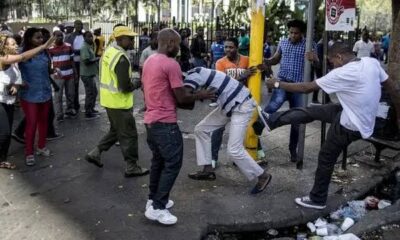Strictly Personal
Africa’s ‘kill the gays’ laws may be good for its nation-building and economic recovery, By Charles Onyango-Obbo
Published
2 years agoon

Uganda President Yoweri Museveni, at the start of the week, signed into law the world’s harshest anti-LGBTIQA+ bill. Dubbed by critics the “Kill the Gays” law, it imposes the death penalty or life imprisonment for certain same-sex acts, up to 20 years in prison for “recruitment, promotion and funding” of same-sex “activities,” and the death penalty for “attempted aggravated homosexuality.”
Uganda joins just a handful of countries in the world penalising lesbian, gay, bisexual, transgender, intersex, queer/questioning, asexual (LGBTIQA+) people with death: Afghanistan, Brunei, Iran, Saudi Arabia, United Arab Emirates, Yemen, Mauritania, and Somalia.
A key force behind the “Kill the Gays” bill is conservative Ugandan cultural and Christian groups in alliance with American fundamentalist churches. Their success has been spectacular, because Uganda becomes the first majority “Christian country” that has a law that specifies hanging and life imprisonment for some homosexual acts.
The “Kill the Gays” law might be shocking in its cruelty, but it is made possible by the high levels of homophobia in the country. Some polls have put opposition to homosexuality at over 90 per cent. This is strange because, in Uganda, there is a near epidemic of rape and defilement of children by heterosexual men and virtually no attacks by homosexuals.
This tells us that, like in other countries like Ghana, Kenya and Malawi, where homophobia is on a new spike, this is not about the threat paused by homosexuality. It is, first and ironically, about the terror of what the cultural and political establishments view as heterosexual deviance.
It is expressed in homophobia, which they consider an even worse form of deviance because of more hate and widespread fear of it. Because of that, it is a significant and cheap bipartisan issue that governments facing risky legitimacy crises can’t resist tapping into. In fact, they need it.
This is bigger than Uganda. If one looks ahead, the news is not good – a decade of virulent homophobia and “kill the gays” laws is coming to Africa.
It is possible to see where that wave will be highest. It will be in countries failing to manage their debt and other economic crises and where elite factionalism is high — like Ghana, Malawi, Zimbabwe, and possibly Kenya. It will be mild or non-existent in countries not in debt peril (or where governments can pay it) or dire economic straits, including Botswana, Benin, Madagascar and Eswatini.
A big part of this homophobia is a response to a changing world and the fear by the old, cultural and political guardians of what they see ahead. These guardians rightly view sexual liberation and other new forms of expression as central to the new subversive order.
Not only are young Africans on a rampage of free sex that they post on their social media pages, but there are also many of them who are not doing it; they are abstaining, getting married late or not at all, or choosing single motherhood (African men today are unworthy, too many young women claim).
There is also a growing army of something the elders don’t understand; African men who don’t want to settle down or be fathers. Some of these young men have grandfathers who are still alive and grew up in a time when they thought it was their duty to make every young woman in their village or street pregnant, and where the only serious men were polygamists.
Their betrayal is too much.
As if that wasn’t enough, there has been an outbreak of what the traditionalists describe as “uncontrollable” and “ungovernable” African women all over the place. They bow to no man (choose which one they will date long-term or sleep with for a one-night stand), have their own money and careers, and dare go out in groups and buy their own drinks.
And many African women are bisexual.
Looking at all this, the guardians think the Devil is using homosexuality to bring the collective African nation down. Criminalising gay sex, to them, the most permissive form of social liberation and “Western cultural imperialism,” and shepherding the “lost sheep” back into the fold so they can produce more children to keep society strong — as their parents and grandparents did — is a strategic and national security imperative.
Therefore, the homophobic national consensus in many countries will be an important basis for nation-building and economic recovery on the continent for a while. It will get louder and nastier.
One could even argue that it would be concerning if “kill the gays” laws like Uganda’s didn’t come to pass. It would have suggested that there was no social transformation and disruption of the old world. Or at least not enough to worry the elders.
Uganda’s anti-gay war is part of a broader proxy war, over easily the most far-reaching social and cultural transformation in Africa of the post-independence era. Great wars are made great by the stories of their heroes, and world-changing causes need martyrs.
Ugandan prisons full of people who were jailed because they wore rainbow T-shirts or were consenting adult men who kissed each other on the cheeks in their living room but were seen by a nosy peeping Tom neighbour who reported them to the police might be the cast of heroes and martyrs it needs.
They could be the bricks with which a future free society beyond the suffocating one the ruling National Resistance Movement has imposed on it for nearly 40 years is built.
Charles Onyango-Obbo is a journalist, writer, and curator of the “Wall of Great Africans”. Twitter@cobbo3
You may like
-


Kenyan court convicts housemate of slain LGBTQ activist of murder
-


Let’s merge EAC and Igad, By Nuur Mohamud Sheekh
-


Hundreds of LGBTQ+ supporters mark 35 years of Pride March in Johannesburg
-


African Union must ensure Sudan civilians are protected, By Joyce Banda
-


Economic policies must be local, By Lekan Sote
-


Ghanaian stages one-man protest in support of LGBTQ+ rights
Strictly Personal
Let’s merge EAC and Igad, By Nuur Mohamud Sheekh
Published
1 month agoon
November 27, 2024
In an era of political and economic uncertainty, global crises and diminishing donor contributions, Africa’s regional economic communities (RECs) must reimagine their approach to regional integration.
The East African Community (EAC) and the Intergovernmental Authority on Development (Igad), two critical RECs in East Africa and the Horn of Africa have an unprecedented opportunity to join forces, leveraging their respective strengths to drive sustainable peace and development and advance regional economic integration and promote the African Continental Free Trade Area (AfCFTA).
Already, four of the eight Igad member states are also members of the EAC and, with Ethiopia and Sudan showing interest, the new unified bloc would be formidable.
Igad’s strength lies in regional peacemaking, preventive diplomacy, security, and resilience, especially in a region plagued by protracted conflicts, climate challenges, and humanitarian crises. The EAC, on the other hand, has made remarkable strides in economic integration, exemplified by its Customs Union, Common Market, and ongoing efforts toward a monetary union. Combining these comparative advantages would create a formidable entity capable of addressing complex challenges holistically.
Imagine a REC that pairs Igad’s conflict resolution strengths with the EAC’s diplomatic standing and robust economic framework. Member states of both are also contributing troops to peacekeeping missions. Such a fusion would streamline efforts to create a peaceful and economically prosperous region, addressing the root causes of instability while simultaneously promoting trade investment and regional cooperation.
These strengths will be harnessed to deal with inter-state tensions that we are currently witnessing, including between Ethiopia and Somalia over the Somaliland MoU, strained relations between Djibouti and Eritrea, and the continually deteriorating relations between Eritrea and Ethiopia.
The global economy experienced as a result of the COVID-19 pandemic, compounded by the Ukraine war and competing global crises, has strained donor countries and reduced financial contributions to multilateral organisations and African RECs. Member states, many of which are grappling with fiscal constraints, are increasingly unable to fill this gap, failing to make timely contributions, which is in turn affecting key mandate areas of Igad and EAC, and staff morale.
A merger between Igad and EAC would alleviate this financial pressure by eliminating redundancies. Shared administrative systems, integrated programmes, and a unified leadership structure would optimise resources, enabling the new REC to achieve more with less. Staff rationalisation, while sensitive, is a necessary step to ensure that limited funds are channelled toward impactful initiatives rather than duplicative overheads.
The African Union (AU) envisions a fully integrated Africa, with RECs serving as the building blocks of the AfCFTA. A unified EAC-Igad entity would become a powerhouse for regional integration, unlocking economies of scale and harmonising policies across a wider geographical and economic landscape.
This merger would enhance the implementation of the AfCFTA by creating a larger, more cohesive market that attracts investment, fosters innovation, and increases competitiveness. By aligning trade policies, infrastructure projects, and regulatory frameworks, the new REC could serve as a model for others, accelerating continental integration.
The road to integration is not without obstacles. Political will, divergent institutional mandates, and the complexity of harmonising systems pose significant challenges. However, these hurdles are surmountable through inclusive dialogue, strong leadership, and a phased approach to integration.
Member states must prioritise the long-term benefits of unity over short-term political considerations. Civil society, the private sector, the youth, and international partners also have a critical role to play in advocating for and supporting this transformative initiative.
The time for EAC and Igad to join forces is now. By merging into a single REC, they would pool their strengths, optimise resources, and position themselves as a driving force for regional and continental integration. In doing so, they would not only secure a prosperous future for their citizens and member states but also advance the broader vision of an integrated and thriving Africa.
As the world grapples with crises, Africa must look inward, embracing the power of unity to achieve its potential. A combined Igad-EAC is the bold step forward that the continent needs.
Nuur Mohamud Sheekh, a diplomatic and geopolitical analyst based in London, is a former spokesperson of the Igad Executive Secretary. X: @NuursViews
Strictly Personal
Budgets, budgeting and budget financing, By Sheriffdeen A. Tella, Ph.D.
Published
1 month agoon
November 20, 2024
The budget season is here again. It is an institutional and desirable annual ritual. Revenue collection and spending at the federal, State and local government levels must be authorised and guided by law. That is what budget is all about. A document containing the estimates of projected revenues from identified sources and the proposed expenditure for different sectors in the appropriate level of government. The last two weeks have seen the delivery of budget drafts to various Houses of Assembly and the promise that the federal government would present its draft budget to the National Assembly.
Do people still look forward to the budget presentation and the contents therein? I am not sure. Citizens have realised that these days, governments often spend money without reference to the approved budget. A governor can just wake up and direct that a police station be built in a location. With no allocation in the budget, the station will be completed in three months. The President can direct from his bathroom that 72 trailers of maize be distributed to the 36 states as palliatives. No budget provision, and no discussion by relevant committee or group.
We still operate with the military mentality. We operated too long under the military and of the five Presidents we have in this democracy, two of them were retired military Heads of State. Between them, they spent 16 years of 25 years of democratic governance. Hopefully, we are done with them physically but not mentally. Most present governors grew up largely under military regimes with the command system. That is why some see themselves as emperor and act accordingly. Their direct staff and commissioners are “Yes” men and women. There is need for disorientation.
The importance of budget in the art of governance cannot be overemphasized. It is one of the major functions of the legislature because without the consideration and authorisation of spending of funds by this arm of government, the executive has no power to start spending money. There is what we refer to as a budget cycle or stages. The budget drafting stage within the purview of the executive arm is the first stage and, followed by the authorisation stage where the legislature discusses, evaluates and tinkers with the draft for approval before presenting it to the President for his signature.
Thereafter, the budget enters the execution phase or cycle where programmes and projects are executed by the executive arm with the legislature carrying out oversight functions. Finally, we enter the auditing phase when the federal and State Auditors verify and report on the execution of the budgets. The report would normally be submitted to the Legislature. Many Auditor Generals have fallen victim at this stage for daring to query the executives on some aspects of the execution in their reports.
A new budget should contain the objectives and achievements of the preceding budget in the introduction as the foundation for the budget. More appropriately, a current budget derives its strength from a medium-term framework which also derives its strength from a national Development Plan or a State Plan. An approved National Plan does not exist currently, although the Plan launched by the Muhammadu Buhari administration is in the cooler. President Tinubu, who is acclaimed to be the architect of the Lagos State long-term Plan seems curiously, disillusioned with a national Plan.
Some States like Oyo and Kaduna, have long-term Plans that serve as the source of their annual budgets. Economists and policymakers see development plans as instruments of salvation for developing countries. Mike Obadan, the former Director General of the moribund Nigeria Centre for Economic and Management Administration, opined that a Plan in a developing country serves as an instrument to eradicate poverty, achieve high rates of economic growth and promote economic and social development.
The Nigerian development plans were on course until the adoption of the World Bank/IMF-inspired Structural Adjustment Programme in 1986 when the country and others that adopted the programme were forced to abandon such plan for short-term stabilisation policies in the name of a rolling plan. We have been rolling in the mud since that time. One is not surprised that the Tinubu administration is not looking at the Buhari Development Plan since the government is World Bank/IMF compliant. It was in the news last week that our President is an American asset and by extension, Nigeria’s policies must be defined by America which controls the Bretton Woods institutions.
A national Plan allows the citizens to monitor quantitatively, the projects and programmes being executed or to be executed by the government through the budgeting procedure. It is part of the definitive measures of transparency and accountability which most Nigerian governments do not cherish. So, you cannot pin your government down to anything.
Budgets these days hardly contain budget performance in terms of revenue, expenditure and other achievements like several schools, hospitals, small-scale enterprises, etc, that the government got involved in successfully and partially. These are the foundation for a new budget like items brought forward in accounting documents. The new budget should state the new reforms or transformations that would be taking place. Reforms like shifting from dominance of recurrent expenditure to capital expenditure; moving from the provision of basic needs programmes to industrialisation, and from reliance on foreign loans to dependence on domestic fund mobilisation for executing the budget.
That brings us to the issue of budget deficit and borrowing. When an economy is in recession, expansionary fiscal policy is recommended. That is, the government will need to spend more than it receives to pump prime the economy. If this is taken, Nigeria has always had a deficit budget, implying that we are always in economic recession. The fact is that even when we had a surplus in our balance of payment that made it possible to pay off our debts, we still had a deficit budget. We are so used to borrowing at the national level that stopping it will look like the collapse of the Nigerian state. The States have also followed the trend. Ordinarily, since States are largely dependent on the federal government for funds, they should promote balanced budget.
The States are like a schoolboy who depends on his parents for school fees and feeding allowance but goes about borrowing from classmates. Definitely, it is the parents that will surely pay the debt. The debt forgiveness mentality plays a major role in the process. Having enjoyed debt forgiveness in the past, the federal government is always in the credit market and does not caution the State governments in participating in the market. Our Presidents don’t feel ashamed when they are begging for debt forgiveness in international forum where issues on global development are being discussed. Not less than twice I have watched the countenance of some Presidents, even from Africa, while they looked at our president with disdain when issues of debt forgiveness for African countries was raised.
In most cases, the government, both at the federal and state cannot show the product of loans, except those lent by institutions like the World Bank or African Development Bank for specific projects which are monitored by the lending institutions. In other cases, the loans are stolen and transferred abroad while we are paying the loans. In some other cases, the loans are diverted to projects other than what the proposal stated. There was a case of loans obtained based on establishing an international car park in the border of the State but diverted to finance the election of a politician in the State. The politician eventually lost the election but the citizens of the State have to be taxed to pay the loan. Somebody as “Nigeria we hail thee”.
Transformation in budgeting should commence subsequently at the State and federal level. Now that local government will enjoy some financial autonomy and therefore budgeting process, they should be legally barred from contracting foreign loans. They have no business participating in the market. They should promote balanced budget where proposed expenditures must equal the expected revenues from federal and internal sources. The State government that cannot mobilise, from records, up to 40 percent of its total budget from IGR should not be supported to contract foreign loans. The States should engage in a balanced budget. The federal government budget should shift away from huge allocations to recurrent expenditure towards capital expenditure for capital formation and within the context of a welfarist state.
Sheriffdeen A. Tella, Ph.D.
EDITOR’S PICK


‘Don’t start what you can’t finish’, ex-Nigerian official replies President Tchiani
Former Nigerian Aviation Minister, Femi Fani-Kayode, has told President Abdourahamane Tchiani of Niger Republic to refrain from making infantile and...


Again, Starlink raises prices of its services in Nigeria
Elon Musk’s satellite internet service provider, Starlink, has again jacked up the prices of its services in Nigeria after an...


Former President of Moroccan club Raja sentenced to 3 years in prison
The former President of Moroccan top club, Raja Casablanca, Mohamed Aouzal, has been sentenced to three and a half years...


Zambia announces second case of Mpox as country battles cholera outbreak
The Zambian Ministry of Health has reported a second case of Monkeypox, popularly known as Mpox, in Kitwe region of...


Obama names three African artistes in his Favorite Music list 2024
In keeping with the tradition of naming his favourite music list of the year, former United States President, Barack Obama,...


NCAS President confirms Nigerians killed extrajudicially in South Africa in 2024
The President of the Nigerian Citizens Association in South Africa (NCAS), Frank Onyewekelu, has confirmed that at least 20 Nigerians...


Niger citizen knocks President Tchiani for neglecting critical issues at home to peddle rumours against Nigeria
A citizen of Niger Republic has slammed the country’s military leader, President Abdourahmane Tchiani, for neglecting critical issues facing the...


Moroccan tourist arrivals hit record-breaking 16 million
The year 2024 has seen Morocco celebrate a record-breaking 16 million tourist arrivals, surpassing the 12 million mark set in...


Safaricom Ethiopia launches 4G network in Gambella
Ethiopia’s second largest telecom provider, Safaricom Telecommunications Ethiopia P.L.C., has announced the official launching of its 4G network services in...


Dumping England for Nigeria the best decision of my life— Ademola Lookman
Current African Men’s Footballer of the Year, Ademola Lookman, has attributed his rise in the football echelon to his decision...


